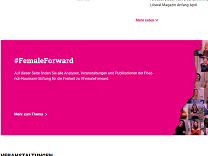Job: Stellenausschreibung: Finanz- & Personalsachbearbeiter*in (w/m/d) in Mitteleuropa und Baltische Staaten https://www.freiheit.org/de/mitteleuropa-und-baltische-staaten/stellenausschreibung-finanz-personalsachbearbeiterin-wmd
Zum 1. Januar 2024 ist die Stelle eines/einer Finanz- & Personalsachbearbeiter*in für Mitteleuropa und die Baltische Staaten im Büro in Prag in Vollzeit mit 40 Wochenstunden, befristet bis zum 31. Dezember 2025 zu besetzen.
Förderrichtlinienkonformität und Rechnungsbegleichung per

